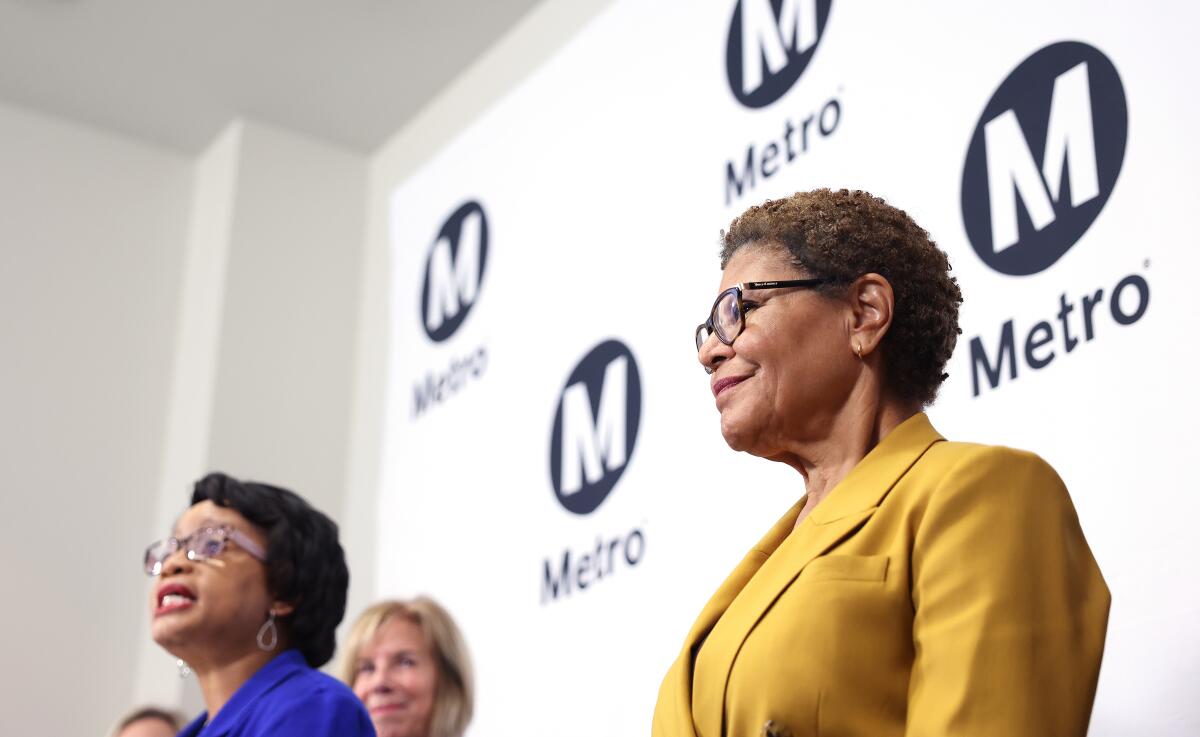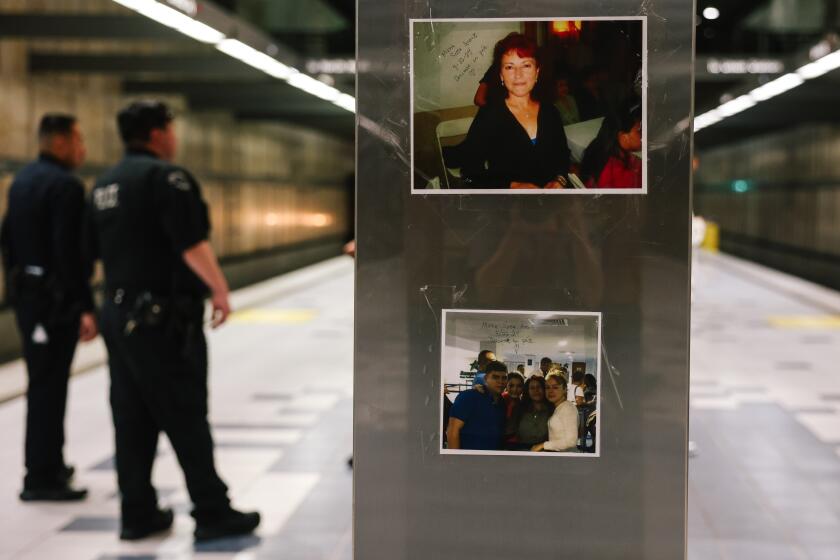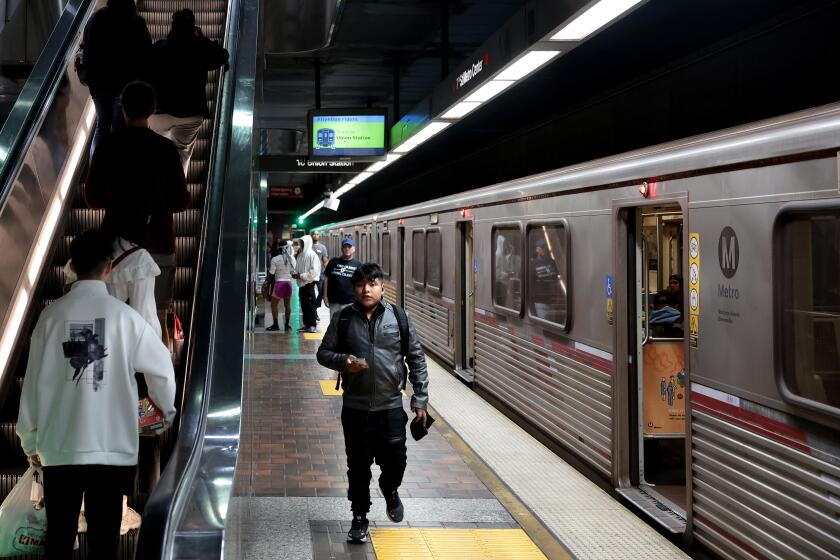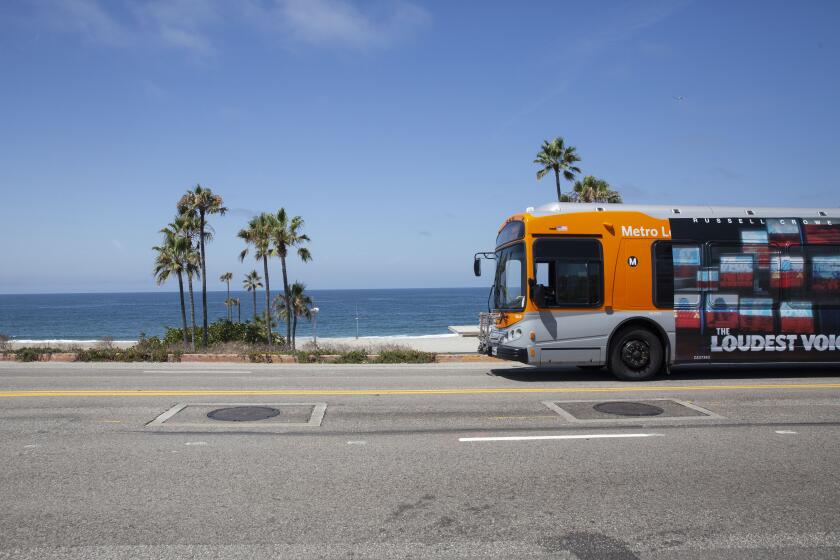Metro’s ‘surge’ of police isn’t the long-term solution L.A. needs for safer buses and trains

- Share via
Hoping to end a recent spike in violent and deadly assaults, Metro’s governing board last week formally approved a “surge” of public safety personnel on buses and trains. The goal is to prevent crime and keep riders from abandoning trains and buses by flooding the system with more police officers and sheriff’s deputies, along with Metro’s own security officers and customer-service ambassadors.
It’s worth a try. Metro cannot afford to lose passengers or public support if Los Angeles wants to have “car-free” Olympics in 2028.
Violent attacks on the Metro system have scared riders and present an existential threat to public transit in Los Angeles. Leaders have to make major changes to keep the system viable.
But the surge is a temporary strategy to deal with the increase in violent crime, Mayor Karen Bass, who is the current chair of Metro, has said. What’s next? Yes, there’s been a frightening spate of assaults, stabbings and killings in the last month, however riders have been ditching transit for years because they felt unsafe — even when violent crime was low. The vast majority of safety concerns cited by riders are about comfort and cleanliness, as well as code of conduct violations.
Metro needs a long-term plan to make transit feel safer.
That should start with a hard look at the current policing contracts. Since 2017, Metro has spent nearly $1 billion on law enforcement contracts with the Los Angeles County Sheriff’s Department and the Los Angeles and Long Beach police departments to patrol the system. But it’s unclear whether Metro is getting its money’s worth from those contracts.
Metro is slated to spend $195 million on law enforcement this fiscal year. The former head of Metro security says taxpayers are not getting their money’s worth.
A 2022 audit by Metro’s Office of Inspector General found that law enforcement agencies had poor visibility in the system. For example, sheriff’s deputies worked mostly from patrol cars outside stations and bus stops.
Metro’s former chief safety officer, Gina Osborn, tracked law enforcement performance over two years and told Times’ reporter Rachel Uranga that she became convinced the agencies were failing at basic patrols and not acting proactively to keep the system safer. Osborn said she was fired in March from Metro after reporting her concerns to the inspector general.
Metro passengers are scared: ‘I’ve lived in L.A. all my life, and I’ve never seen the level of violence that I’m seeing now. It’s like an insane asylum’
But her complaints were not new. Last year when Metro’s governing board voted to extend the law enforcement contracts for up to three years, leaders said they were frustrated that the agency couldn’t monitor or even direct where and how officers were deployed on the system. And again last week, Bass and other board members complained that Metro CEO Stephanie Wiggins did not have authority to direct officer deployment.
As part of Bass’ surge motion, the governing board ordered the creation of a unified command controlled by Metro’s security team that will coordinate law enforcement, security and social services deployment. But even with the unified command, Metro will not have authority to direct law enforcement deployment. That’s a huge problem. How can Metro effectively manage security when it cannot assign officers to patrol specific areas to prevent and respond to crime on the system?
Twenty-five participants in a journalism fellowship in L.A. used Metro buses and trains to get to multiple meetings a day for a week. Safely. Happily. And on time.
Making sure Metro is getting its money’s worth will be even more important this summer when its law enforcement costs rise. The cost of the contracts will increase 10% in the fiscal year that starts July — and that was before the surge increased officer deployment. That prompted L.A. County Supervisor Lindsey Horvath to call for a cost comparison between law enforcement agencies, security officers and ambassadors “to figure out how we can achieve the most effective, visible presence with the dollars we have to spend.”
Besides cost, Metro also has to grapple with how to maintain security and order on the system.
In the past, Metro tasked sworn officers with enforcing fare evasion and code of conduct violations, such as littering and playing loud music. But there were complaints and a federal investigation into racial bias in fare enforcement. During a code of conduct crackdown in 2018, an LAPD officer dragged a young woman off a subway train because she refused to take her foot off the seat. (The city of L.A. paid her $50,000 last year to settle the lawsuit against the LAPD, her lawyer told The Times.)
Metro transferred fare and conduct enforcement to civilian security in recent years to help address long-standing complaints of racial bias in the policing of the system. Sworn officers were focused on enforcing the penal code and responding to crime.
There’s now a call from riders and local elected officials to ramp up fare and conduct enforcement, including by police officers. Metro leaders should tread carefully as they decide how to build a comprehensive public safety response that may include creating an in-house transit police force. In making the buses and trains safer today and into the future, they don’t want to repeat the mistakes of the past.
More to Read
A cure for the common opinion
Get thought-provoking perspectives with our weekly newsletter.
You may occasionally receive promotional content from the Los Angeles Times.










